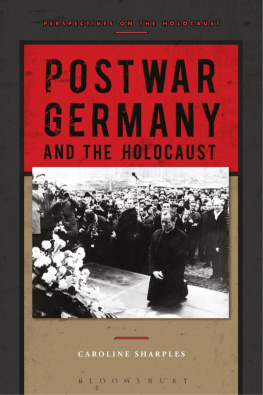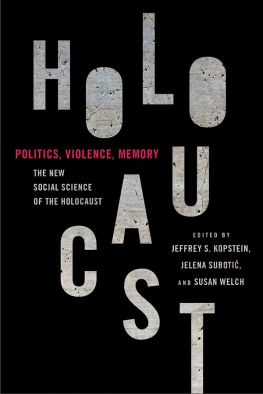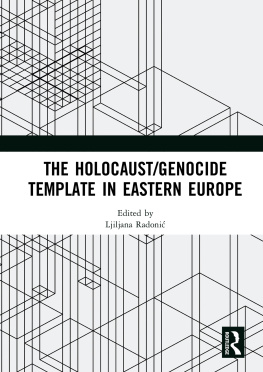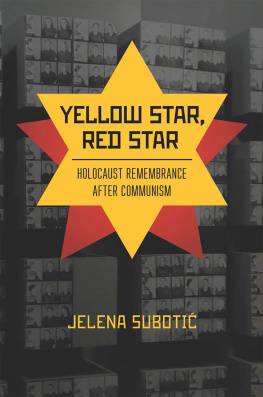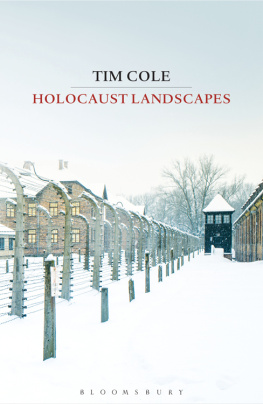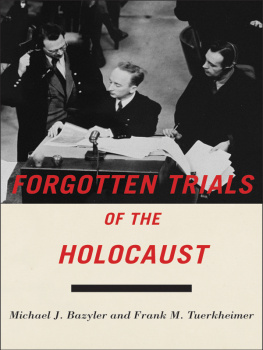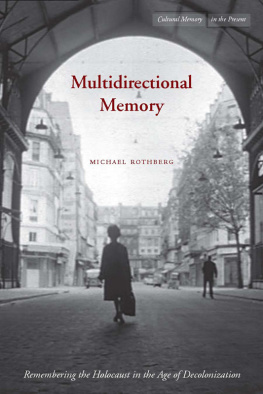Memory and Forgetting in the Post-Holocaust Era
This book is a courageous critique of generalizing the Holocaust into a universal frame for evil and victimhood, and making the commemoration of massive violence a moral obligation. With sensitivity, the authors examine the costs of the ensuing divisiveness, and propose dialogue, compromise, and the acknowledgment of past suffering instead.
Antonius C. G. M. Robben,Utrecht University, Netherlands
To forget after Auschwitz is considered barbaric. Baer and Sznaider question this assumption not only in regard to the Holocaust but to other political crimes as well. The duties of memory surrounding the Holocaust have spread around the globe and interacted with other narratives of victimization that demand equal treatment. Are there crimes that must be forgotten and others that should be remembered?
In this book the authors examine the effects of a globalized Holocaust culture on the ways in which individuals and groups understand the moral and political significance of their respective histories of extreme political violence. Do such transnational memories facilitate or hamper the task of coming to terms with and overcoming divisive pasts? Taking Argentina, Spain and a number of sites in post-communist Europe as test cases, this book illustrates the transformation from a nationally oriented ethics to a transnational one. The authors look at media, scholarly discourse, NGOs dealing with human rights and memory, museums and memorial sites and examine how a new generation of memory activists revisits the past to construct a new future. Baer and Sznaider follow these attempts to maneuver between the duties of remembrance and the benefits of forgetting. This, the authors argue, is the ethics of Never Again.
Alejandro Baer is Associate Professor of Sociology, Stephen C. Feinstein Chair and Director of the Center for Holocaust and Genocide Studies at the University of Minnesota, USA.
Natan Sznaider is a Full Professor of Sociology at the Academic College of Tel-Aviv-Yaffo, Israel.
Memory Studies: Global Constellations
Series editor: Henri Lustiger-Thaler
Ramapo College of New Jersey, USA and Ecole des Hautes Etudes en Sciences Sociales, France
The past in the present has returned in the early twenty-first century with a vengeance, and with it the expansion of categories of experience. These experiences have largely been lost in the advance of rationalist and constructivist understandings of subjectivity and their collective representations. The cultural stakes around forgetting, useful forgetting and remembering, locally, regionally, nationally and globally have risen exponentially. It is therefore not unusual that migrant memories; micro-histories; personal and individual memories in their interwoven relation to cultural, political and social narratives; the mnemonic past and present of emotions, embodiment and ritual; and finally, the mnemonic spatiality of geography and territories are receiving more pronounced hearings.
This transpires as the social sciences themselves are consciously globalizing their knowledge bases. In addition to the above, the reconstructive logic of memory in the juggernaut of galloping informationalization is rendering it more and more publicly accessible, and therefore part of a new global public constellation around the coding of meaning and experience. Memory studies as an academic field of social and cultural inquiry emerges at a time when global public debate buttressed by the fragmentation of national narratives has accelerated. Societies today, in late globalized conditions, are pregnant with newly unmediated and unfrozen memories once sequestered in wide collective representations. We welcome manuscripts that examine and analyze these profound cultural traces.
Titles in this series
The Slave Ship, Memory and the Origin of Modernity
Martyn Hudson
Forthcoming in this series
War Memory and Commemoration
Brad West
Transitional Justice and Memory in Cambodia
Peter Manning
First published 2017
by Routledge
2 Park Square, Milton Park, Abingdon, Oxon OX14 4RN
and by Routledge
711 Third Avenue, New York, NY 10017
Routledge is an imprint of the Taylor & Francis Group, an informa business
2017 Alejandro Baer and Natan Sznaider
The right of Alejandro Baer and Natan Sznaider to be identified as authors of this work has been asserted by them in accordance with sections 77 and 78 of the Copyright, Designs and Patents Act 1988.
All rights reserved. No part of this book may be reprinted or reproduced or utilised in any form or by any electronic, mechanical, or other means, now known or hereafter invented, including photocopying and recording, or in any information storage or retrieval system, without permission in writing from the publishers.
Trademark notice: Product or corporate names may be trademarks or registered trademarks, and are used only for identification and explanation without intent to infringe.
British Library Cataloguing in Publication Data
A catalogue record for this book is available from the British Library
Library of Congress Cataloging in Publication Data
Names: Baer, Alejandro, 1970 author. | Sznaider, Natan, 1954 author.
Title: Memory and forgetting in the post-Holocaust era : the ethics of
never again / Alejandro Baer and Natan Sznaider.
Description: Milton Park, Abingdon, Oxon ; New York : Routledge,
[2017] | Series: Memory studies: global constellations | Includes
bibliographical references and index.
Identifiers: LCCN 2016025448 | ISBN 9781315616193 (e-book)
Subjects: LCSH: Holocaust, Jewish (19391945)ArgentinaPublic
opinion. | Holocaust, Jewish (19391945)SpainPublic opinion. |
Holocaust, Jewish (19391945)Europe, EasternPublic opinion. |
Public opinionArgentina. | Public opinionSpain. | Public opinion
Europe, Eastern. | Collective memoryArgentina. | Collective
memorySpain. | Collective memoryEurope, Eastern. | Genocide
Case studies. | Crimes against humanityCase studies.
Classification: LCC D804.45.A74 B34 2017 | DDC 179.7dc23
LC record available at https://lccn.loc.gov/2016025448
ISBN: 978-1-4724-4894-1 (hbk)
ISBN: 978-1-315-61619-3 (ebk)
Typeset in Times New Roman
by Apex CoVantage, LLC
3.4 Picture taken on July 18, 2009, during the exhumation of a mass grave in the village of Milagros (Province of Burgos). Pedro Cancho, from Riaza, displays a photograph of his grandfather, of the same name, executed by paramilitary during the
Spanish Civil War (19361939) and allegedly buried in that grave. Photo courtesy of Francisco Ferrndiz.
3.6 Holocaust remembrance ceremony on January 27th, 2015, at
the Spanish Senate in Madrid, presided by King Felipe VI. Speaking at the pdium is Spains chief Rabbi Moshe Bendahan. Photo courtesy of Centro Sefarad-Israel.


